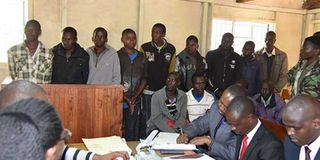Petty offences create backlogs in African courts, report shows

Suspects appearing in a Kenyan court. court Statistics from the International Centre for Prisons on Kenya, Malawi, Ghana, South Africa and Cote d’Ivoire show that the minor offences are among most prosecuted cases in the courts. PHOTO | FILE | NATION MEDIA GROUP
What you need to know:
- Cote d’Ivoire, which had 40 correctional centres as of 2017 was at 196.9 percent.
- If petty offences cases in Kenya lead to convictions and inability to pay fines, serving sentences would congest prisons further.
- The conference in Ghana commission is part of a two-year pilot project on decriminalisation of petty offences in Africa.
Petty offences have widely contributed to backlogs of cases in African courts, statistics have shown.
The statistics from the International Centre for Prisons on Kenya, Malawi, Ghana, South Africa and Cote d’Ivoire show that the minor offences are among most prosecuted cases in the courts.
At least 119 prison facilities, for instance in Kenya, had an occupancy of 220.7 percent as of August 2016 while in Malawi’s 30 prisons, the occupancy level stood at 211.4 percent.
Cote d’Ivoire, which had 40 correctional centres as of 2017 was at 196.9 percent.
Ghana had 43 prisons as of March 2015 with an occupancy of 146.5 percent while South Africa had 136 percent occupancy in the 243 prisons as of March 2017.
28,000 PETTY OFFENCES
Another study, The Criminal Justice Report says 28,768 charges prosecuted in 15 Kenyan courts between the 2013 and 2014 were petty offences.
The report shows that there were 18,058serious offences.
According to Network of African National Human Rights Institutions (Nanhri), a non-governmental organisation, if the petty offences cases in Kenya lead to convictions and inability to pay fines by the suspects, serving sentences would congest prisons further.
Nanhri is a non-profitable organisation that brings together 44 national human rights institutions in Africa.
Human rights groups are set to converge for a two-day regional conference in Accra, Ghana to discuss strategies of reviewing laws criminalising petty offences in Africa.
REDUCE PRISON CONGESTION
Nanhri Executive Director Gilbert Sebihogo said the conference is aimed at reducing congestion in prisons and human rights violations against poor and vulnerable people.
“Upon conviction, the accused persons are sentenced to a jail term with an alternative of paying fines. Most times, inability to pay leads to serve the sentence.
Entrenching in law alternative punishments such as warnings, community service, pardon, electronic monitoring, among others, would reduce congestion in prisons, which are already more than thrice their capacity,” said Mr Sebihogo in a statement.
DECRIMINALISE PETTY OFFENCES
Among the institutions at the conference is the Kenya National Commission on Human Rights (KNCHR), the Commission on Human Rights and Administrative Justice of Ghana, the Malawi Human Rights Commission, South African Human Rights Commission and the National Commission on Human Rights of Cote d’Ivoire.
The conference which will be hosted by the Ghana commission is part of a two-year pilot project on decriminalisation of petty offences in Africa.
Criminal offences and penal codes of various countries in Africa classify loitering, disobedience to parents, begging, minor traffic offences, prostitution, being a vagabond, hawking, being drunk and disorderly or a public nuisance, amongst others, as petty offences.




